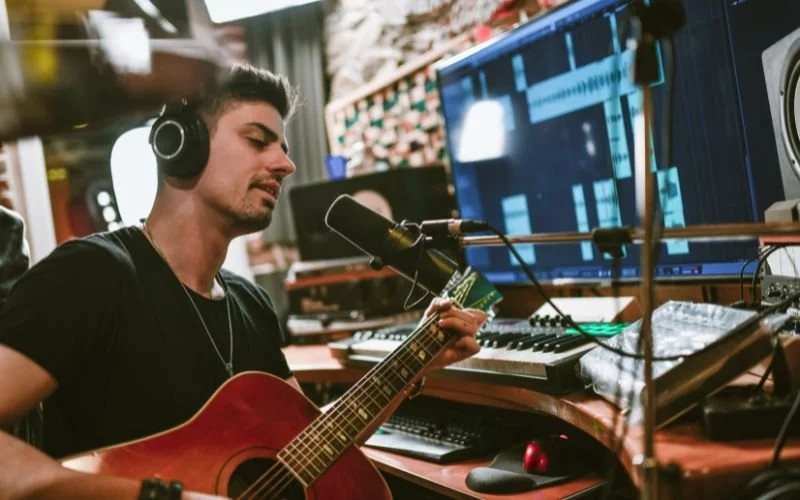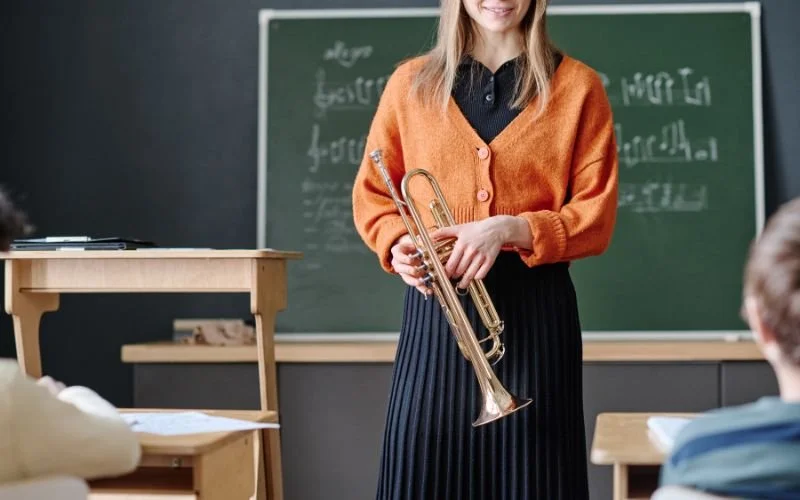Playing music by heart: techniques, advantages and disadvantages
Want to play an instrument without having to keep an eye on your sheet music?
Often practiced in music lessons, learning a score by heart makes it easier for performers to master a piece. This practice requires a certain amount of memory and allows you to connect fully with the music.
But beyond mastery of music theory, learning by heart requires practical and technical know-how. The objectives? Anticipate the notes, structure and movements of a piece.
Advantages, disadvantages, techniques and tips: Newzik shares with you all the steps you need to take to memorize your sheet music by heart. Follow the guide!
Learning and playing music by heart: what does it mean?
Memorize notes to be able to play without sheet music
Learning to play without a score is often the musician's ultimate goal when trying to master a piece. A complex exercise, playing by heart calls on different forms of memory:
visual memory: memorization involves instinctively locating notes on a staff or piano,
Auditory memory: once you've mastered the notes, you need to be able to recognize intervals and sounds without consulting your score,
gestural memory: knowing how to play a piece of music without looking at the score means having previously integrated finger movements or gestures related to the instrument,
analytical memory: in addition to knowing the notes and gestures, you also need to understand the harmonic and rhythmic logic of the piece in order to master it perfectly.
🎵 Looking for tips on how to memorize sheet music ? Discover our tips on how to learn sheet music easily.
Master a piece of music perfectly
For many music teachers, listening to and memorizing a piece until you know it by heart is like mastering a score to perfection.
While not necessary for learning music, this mastery enables the musician to play notes more fluidly. It's also a way of leaving more room for improvisation.
By integrating notes, chords and rythm without having to consult a visual aid, the musician is freed from the framework of music theory to concentrate on interpretation and the pleasure of playing.
💡 Good to know
Quickly identifying notes, melodies, rhythms and chords is not necessarily innate... Learning to play a piece of music by heart is a good way to develop your musical ear.
Learning a musical instrument by heart: advantages and disadvantages
✅ The benefits: avoid memory lapses, concentrate on accuracy and enjoy greater freedom of expression.
Knowing a score allows you to focus on your playing technique.
When you have memory lapses, mastering a piece by heart means less hesitation before placing your fingers on the instrument, and a global vision of a work that allows you to anticipate the rythm from beginning to end. In short: you play much more fluidly.
Knowing a piece by heart also means enjoying greater freedom of expression. Instead of concentrating on reading notes, the musician focuses his or her energy on interpretation and emotion. A musician who doesn't concentrate on a score** will also be more attentive to the nuances and dynamics of a piece.
Another advantage: memorization develops technical skills. Repetition of memorized passages improves dexterity and precision in playing. It's also an excellent way to work on your auditory memory, which is essential for learning solfeggio and theory.
Playing by heart also saves you a great deal of stress in the event of a public presentation. Not having to look down at your score all the time means you can concentrate on interacting with your audience, making the experience a thousand times more rewarding!
❌ Disadvantages: less in-depth gameplay and risk of memory lapses
Contrary to popular belief, playing by heart is not always a guarantee of musical excellence. For Frédéric Chopin and the composers of his time, playing by heart meant improvising and appropriating a score that was not one's own.
While playing music by heart has undeniable advantages, this memorization technique has its limits. Some artists even believe that playing without a score can impoverish a performance, especially if memorization is based solely on gestural reflexes.
Playing with or without a score is not just a question of merit, but also of musical intention. The important thing is to understand the piece and find the right balance between memory, reading and interpretation.
💡 Newzik's helping hand
Tired of reading sheet music? Consult your scores more easily thanks to a dynamic, interactive application! The Newzik score-reading tool lets you read digital scores from your tablet, annotate them and share them in real time with other musicians, even from a distance.
How do you learn a piece of music by heart?
There are several techniques for memorizing a score, and every musician will find the one that suits him best. Among the techniques, there are 3 main memorization methods:
The visual method and memorizing notes
Ideal for children new to music theory, the visual method is based on memorizing shapes and patterns on the score. In concrete terms, this means knowing how to spot chords, arpeggios and repetitive patterns, then visualizing their location on the instrument.
Want to memorize piano pieces by heart? Use sheet music to practice this technique..
The auditory method and recognition by ear
This method is based on attentive listening and reproduction by ear. It allows you to integrate note pitches and harmonic progressions. While knowing all the rules of music theory is not necessary for this method, it is nevertheless useful for recognizing chords by their sound.
Working on your auditory memory also means improving your musical ear: a skill that enables musicians toimprovise more easily.
The gestural or "muscular" method
Fingering on the piano or the position of the fingers on the strings of a guitar are also decisive factors in anticipating the playing of a piece.
Finger position, hand agility: when you play a piece on an instrument, your brain memorizes all your movements.
Also known as "muscle" memory, this gestural method is rooted in the body: fingers and hands memorize sequences through repetition. The more you practice, the more you'll learn the correct positioning and gestures to adopt when playing a piece of music.
Couple this method with a good reading of sheet music to maintain long-term memory.
5 tips for learning a piece of music by heart
1. Decipher and analyze the score in detail
The first thing to do when learning a score is to decipher its structure. Pencil in hand, sit back and analyze the piece.
Study the structure: note sequences, chord patterns, repeats, verses and choruses, etc.
Identify the rhythm: mark beats and tempo throughout the song.
This deciphering stage is easier if you already have a good grounding in music theory.
🎼 Need to brush up on your solfeggio lessons? Here are 5 tips for learning solfeggio the fun way. !
2. Learning the score in stages
Memory is most effective when worked on gradually. It is advisable to work regularly in small sessions, as the brain can only integrate a limited amount of new information. Working step-by-step is advisable when learning music, especially for children and beginners.
Set objectives for each phase:
Session 1: mastery of the theoretical aspect of the score (deciphering staves, memorizing notes, finding tempo).
2nd session: interpretation, phrased work, with score in hand. Play without paying attention to the rythm, simply trying to master the chord sequence. Repeat the piece several times while reading the score.
3rd session: mastering the piece without score. Open your ears and detach yourself from the score. This time, try to play from memory. Make a note of what's missing in your playing and go back to the score.
4th session: repeat the previous step and note your progress. Once you've mastered the score a little better, try playing tricks on your brain by changing the tempo and nuances of the piece. By putting your memory to the test, your brain will retain the information better.
⏺️ Make training easier: listen to yourself!
Record your exercises to assess your progress and listen to yourself. With Newzik, you can record the songs you play and store them on your app. Now it's up to you!
3. Play and train regularly
There's no secret to mastering a piece and a score by heart: you have to practice playing it, and, above all, regularly.
Play the piece you want to learn in its entirety many times, several days in a row. This will help you consolidate what you've learned.
And, when practicing, have fun changing the tempo, working on the difficult passages and starting at the end. The idea? Keep your brain alert to help you memorize the score.
Listening to the song over and over again is also great practice! On headphones, in rehearsal, in concert: let yourself be inspired by different interpretations. Are you just singing? Don't hesitate to sing along with the melody, naming the notes: it's great for your memory.
4. Take the time you need to learn
Learning by heart doesn't happen overnight, especially if you're not used to learning a lesson by heart. Your brain needs time to consolidate what you've learned, especially in music.
Do you have an audition or concert planned? If you want to know exactly what you're going to be doing, it's a good idea to plan several weeks in advance. This will ensure a reliable and, above all, lasting memory.
Even if the piece is well mastered, try to keep the score fresh in your mind: go back over the score, slow down the tempo, rework the technical aspects or refine the interpretation.
5. Play and rehearse in front of others
In front of friends, your music teacher or other musicians in rehearsal: take advantage of your surroundings to practice playing without a score under the demanding conditions of the stage.
Confronting the anguish of the performance is the best way to spot your weaknesses. It's better to see mistakes beforehand in a "test" performance, rather than in a concert on the day.
I promise, with practice and practice, you'll be as comfortable on stage as you are in your living room!
🎼 Trying to learn a musical score by heart? Use the the Newzik applicationa 100% interactive digital sheet music music player.
Easily scroll through the notes of your score on your tablet or computer, and save time memorizing your piece of music!




